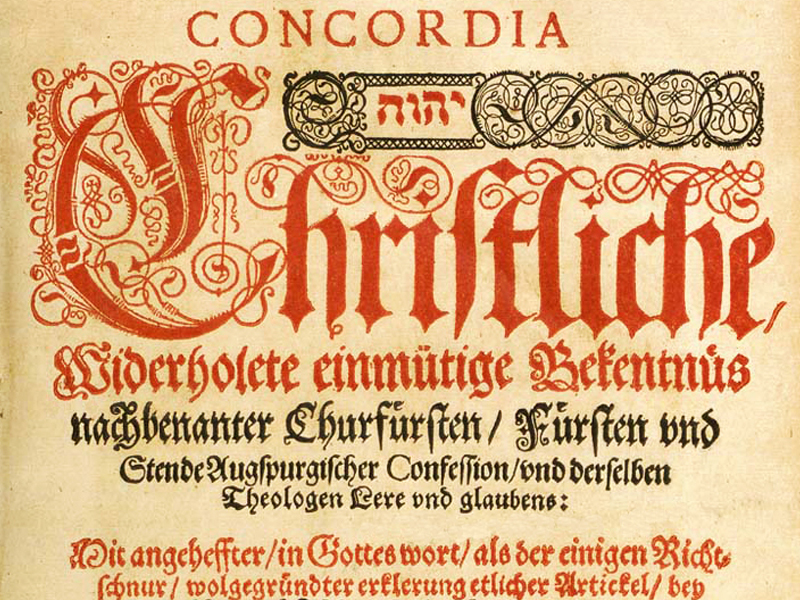by Rev. Aaron Moldenhauer

Martin Luther stood before the Holy Roman Emperor at the Diet of Worms in 1521. A stack of Luther’s books stood on the table in front of him. The chair of the meeting asked him if he acknowledged that these books were his, and if he wished to confess his books or recant. Luther, after deliberating for a day, gave his famous answer: “I cannot and will not retract anything. … Here I stand. God help me. Amen.”[1]
What books was Luther pressured to recant? Among them were three key writings from 1520 that described the specific types of reforms Luther called for. One of these 1520 treatises is The Babylonian Captivity of the Church. In this book Luther critiqued the sacramental system of the medieval Roman church. He summarized his thought on the sacraments and laid out that which is still the confessional Lutheran stance toward the number of sacraments.
Rome as Babylon
The Babylonian Captivity of the Church appeared in print less than a week before the papal bull against Luther reached Wittenberg in October, 1520. Both works were being prepared at the same time: while Rome was working to prosecute Luther’s heresy trail, Luther was putting the Roman sacramental system on trial.
In the book Luther accuses the Roman church and the papacy of holding the church in captivity. As Babylon held Israel captive, now the papacy was holding Christians in bondage by Rome’s theology and use of the sacramental system. Rome’s sacramental system had (and still has) seven sacraments. Luther considers each one in turn. He maintains that only three of the seven are sacraments: baptism, penance, and the bread [that is, communion].[2] These three remaining sacraments, Luther writes, are held captive by the Roman church.
Divine Promise and Faith
At the heart of each sacrament is God’s promise and faith which clings to the promise. For instance, Luther writes that the sacrament of the altar is Christ’s testament. A testament is a promise made by a person about to die. Since the mass, being a testament, is a promise, then access to the mass and its gifts is not gained by merits or works, but solely by faith.[3] God deals with people only through a promise; we deal with God only through faith in his promise. Faith and the promise—here, the promise that stands at the heart of the sacrament of the altar—must go together.[4] In the same way, Luther writes, penance consists in God’s promise and our faith, and the first thing to consider in baptism is the promise tied to the faith given in baptism.[5]
The Roman church held the sacraments captive by suppressing the promise and faith, displacing these key elements with works and merit. By burying the promise in the mass under external rites and the idea of merit earned in the mass, Rome carried the church into a Babylonian captivity.[6] To be precise, Luther writes, the problem is not the rites attached to the mass, but the way that these rites distract from Christ’s words (his promise) at the heart of the mass.[7] Likewise, in baptism the medieval church overlooked faith and instead emphasized penance.[8] And in penance Rome extinguished faith and denied its necessity, elevating contrition over faith in God’s promise.[9]
The Number of Sacraments
Luther applies the diagnostic tool of promise and faith to the four remaining sacraments of the medieval church. That is, Luther looks at each to see if there is a divine promise attached to it that calls for faith. Luther concludes that confirmation, marriage, ordination, and extreme unction do not have a divine promise that calls for faith. While he does not object to these rites, Luther concludes that without the promise or faith they are not sacraments.
Luther writes that it seems best to restrict the name “sacrament” to divine promises with a sign attached to them. By this definition the number of sacraments is further reduced from three to two: baptism and the sacrament of the altar. Penance, which Luther earlier named a sacrament, does not have a sign. Accordingly, Luther argues that either penance should not be considered a sacrament, or a different definition of sacrament should be formed.[10]
The Babylonian Captivity and the Lutheran Confessions

A brief comparison between The Babylonian Captivity of the Church and the Lutheran Confessions may highlight two main points. The first is the number of sacraments, a question tied by both Luther and Melanchthon to the definition of a sacrament. Melanchthon in The Apology of the Augsburg Confession, Article 13, writes that the number of sacraments is of little consequence; what matters more is rightly keeping matters and ceremonies instituted in Scripture. He offers one definition of a sacrament:
“If we call Sacraments ‘rites that have the command of God, and to which the promise of grace is added,’ it is easy to decide what are true Sacraments. … Therefore, Baptism, the Lord’s Supper, and Absolution (which is the Sacrament of Repentance) are truly Sacraments. For these rites have God’s command and the promise of grace.”[11]
Both Luther and Melanchthon show some flexibility with the definition of a sacrament, a flexibility that allows for a limited flexibility on the number of the sacraments. Key to both theologians is not insisting on a firm number, but recognizing what divinely instituted rites bear the divine promise with them.
Second, Melanchthon also places the divine promise and faith at the heart of the sacraments in the Augsburg Confession, Article 13. Those who teach the sacraments without faith are condemned by the Augsburg Confession, even as they are condemned by Luther in The Babylonian Captivity.
Comfort in the Sacraments
While Luther warns readers at the outset that The Babylonian Captivity, being a polemic work, will offer little edification to the reader, great comfort can be found in his consideration of the sacraments.[12] By calling our attention to God’s promise spoken in the sacraments and faith arising from that promise, Luther offers a guide for us to make good use of the sacraments by clinging to the promise of salvation in Christ within them.[13]
The Rev. Aaron Moldenhauer is associate pastor of Zion Lutheran Church, Beecher, IL.
[1] WA 8:838; translation mine.
[2] AE 36:18.
[3] AE 36:37–39.
[4] AE 36:42.
[5] AE 36:58–59, 81–82.
[6] AE 36:47.
[7] AE 36:52.
[8] AE 36:61–62.
[9] AE 36:83–84.
[10] AE 36:124.
[11] Apology 13:3–4; Translation from Paul Timothy McCain, ed., Concordia: The Lutheran Confessions (Saint Louis: Concordia Publishing House), 184.
[12] AE 36:17–18.
[13] See, for instance, Luther’s advice to keep the promise and faith in mind while receiving communion. AE 36:41.